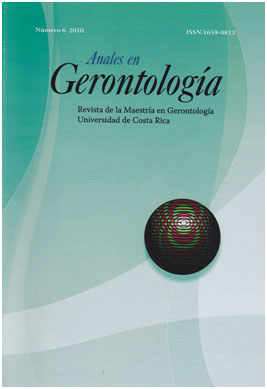Abstract
The results of an educational program on oral health conducted with a group of 21 elderly women from Laguna, Zarcero, Costa Rica to fullfill the requirements of a Magister Degree Program in Gerontology at the University of Costa Rica, are summarized. The main objective of the study was to evaluate the benefits on the oral health of the group of volunteers in response to their participation in an interactive program aimed to promote oral health and to prevent the most common dental problems. The volunteers are members of the group “Amor y Alegría” (Love and Joy) which is part of the Asociación Gerontológica Costarricense (Costa Rican Association of Gerontology). The group belongs to the mid socio-economic class with an adequate physical and cognitive condition to participate in the process. Andragogic principles were used to motivate changes in the traditional hygienic practices used by the participants. The group was also well documented on the tight relationship between oral and general health. A considerable improvement on oral health practices as well as on the attention of dental prothesis was observed at the end of the process. Patients recognized the relevance of proper mastication and salivary flux at the time of food consumption and its relation with self-esteem and became aware of the implications of the oral cavity in the communication process as well as on the facial expression. Predominant problems in the oral health of the participants were associated with the use of prothesis, with periodoncial aspects and with the traditional hygienic practices used and with the ignorance of options to treat any specific pathology. It is worth mentioning that the majority of the patients considered teeth deterioration or lost of dental pieces as a normal consequence of aging. The results of this study show the relevance of implementing educational programs on oral health in elderly groups of the country.References
Carranza, F. (1998). Periodontología clínica. McGraw-Hill Interamericana. 56-58.
Denman, C. (2002). Por los rincones. Antología de métodos cualitativos. El Colegio de Sonora. México. 257.
Granados, M. & Quesada, A. C. (2005). Experiencias intergeneracionales en torno a la promoción de la salud en Costa Rica. Revista Anales en Gerontología. 5, 55-70. San José: Universidad de Costa Rica.
Hiroshi, U. Petersen, P. E. & Kandelman, V. (2005). Oral Health In Ageing Societies: Integration of Oral Health and General Health. Report of meeting convened at the WHO Centre for Health Development en Kobe Japan and Department of Chronic Diseases and health Promotion Geneva Switzerland. Recuperado de:
http://www.who.int/oral_health/publications/orh_oral health report 2.pdf
Jara, O. (1994). Para Sistematizar Experiencias. Una propuesta teórica y práctica. Alforja. 22.
Murillo, O. & col. (2005). Educación bucodental dirigida a las personas adultas mayores residentes en los cantones de Coronado, Goicoechea, y Desamparados. San José, Costa Rica. 1-15.
Mustieles, M. (1993). Nueva guía para la sistematización de procesos grupales. Ed. LUMEN. Argentina. 39.
Petersen, P. E. (2003). The World Oral Health Report 2003. Continuos improvement of oral health in the 21st century – the approach of the WHO Global Oral Health Programme. 15. Recuperado de: http://www.who.int/oral_health/publications/orh_oral health report 03 .pdf.
Petersen, P. E. & Yamamoto, T. (2005). Improving the oral health of older people: the approach of the WHO Global Oral Health Programme. Community Dent Oral Epidemiology. 33, 81-92. Recuperado de: http://www.who.int/oral_health/publications/orh_cdoe05_vol33.pdf
Rodríguez, L. (2006). Intervención educativa sobre salud bucal en gerontes institucionalizados de zona rural. Revista Cubana de Estomatología. 43(4). Instituto Superior de Ciencias Médicas. Facultad de Estomatología. Santiago de Cuba. Recuperado de:
http://www.odontologiaonline.com
Sedó, P. (2004). Los significados del alimento: caso del adulto mayor. Red Latinoamericana de Gerontología. Monografía. Recuperado de: http://www.gerontologia.org
Solano, O. (1995). Manual sobre estrategias metodológicas del aprendizaje andragógico. Facultad de Medicina, Escuela de Enfermería. San José: Universidad de Costa Rica. 9-14, 34,35.

